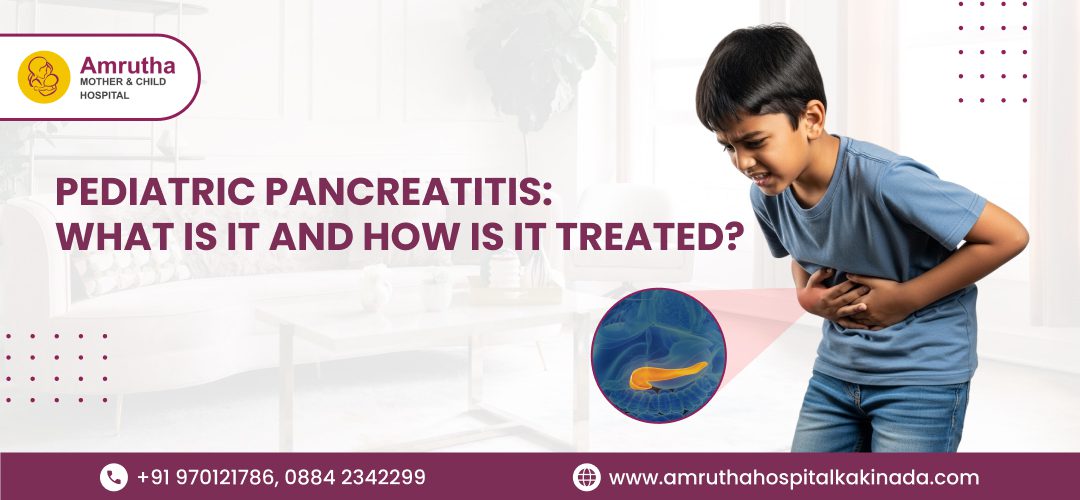The pancreas plays a vital role in digestion and maintaining healthy blood sugar levels. While pancreatitis—an inflammation of the pancreas—is more commonly seen in adults, it can also affect children. Unfortunately, pediatric pancreatitis often goes undiagnosed or misunderstood due to its rarity and symptom overlap with other illnesses.
At Amrutha Mother and Child Hospital, our team of pediatric specialists is experienced in identifying and treating pancreatitis in children with the utmost care and clinical precision. This blog will help parents understand the condition, its symptoms, causes, and how we provide advanced care for young patients.
What is Pediatric Pancreatitis?
Pediatric pancreatitis refers to inflammation of the pancreas in children. It happens when digestive enzymes, which are usually inactive until they reach the small intestine, become active while still in the pancreas. This premature activation causes the pancreas to inflame or even begin to digest itself.
There are two primary forms:
- Acute Pancreatitis: A sudden inflammation that typically improves with medical care in a few days.
- Chronic Pancreatitis: Persistent inflammation that may result in long-term damage, scarring, or loss of pancreatic function.
Causes of Pancreatitis in Children
Pediatric pancreatitis can result from a variety of factors, including:
- Viral infections (like mumps)
- Abdominal injury or trauma
- Genetic disorders (such as cystic fibrosis)
- Certain medications (antibiotics or chemotherapy)
- Congenital abnormalities of the pancreas
- Gallstones or bile duct blockages
- Metabolic issues (high calcium or triglyceride levels)
- Autoimmune conditions
In some children, the cause remains idiopathic—meaning it cannot be clearly identified.
Recognizing the Symptoms
Because symptoms can resemble other common childhood illnesses, early diagnosis can be challenging. Watch for:
- Severe abdominal pain (especially in the upper abdomen or back)
- Nausea and vomiting
- Loss of appetite
- Fever
- Tender or swollen abdomen
- Fatigue or irritability
If your child experiences any of these symptoms—particularly persistent abdominal pain—it’s important to seek medical attention promptly.
How is Pediatric Pancreatitis Diagnosed?
At Amrutha Mother and Child Hospital, our pediatric team uses advanced diagnostic tools to confirm pancreatitis, including:
- Blood tests: To measure pancreatic enzymes like amylase and lipase
- Ultrasound/CT scans: To detect swelling or inflammation
- MRI or MRCP: For detailed imaging of the pancreas and bile ducts
- Genetic testing: If hereditary pancreatitis is suspected
Treatment Options for Pediatric Pancreatitis
1. Acute Pancreatitis Care
Treatment is usually supportive and may include:
- IV fluids to maintain hydration
- Child-safe pain relief
- Temporary fasting or nutritional support
- Monitoring for complications like infections or fluid collections
2. Chronic Pancreatitis Management
In long-term cases, we focus on:
- Enzyme replacement therapy to aid digestion
- Nutritional support, including vitamin supplementation
- Regular monitoring of growth and development
- Surgical options in rare and severe cases
Our Approach at Amrutha Mother and Child Hospital
We adopt a multidisciplinary approach to pediatric pancreatitis, combining the expertise of pediatricians, gastroenterologists, dietitians, and surgeons. Here’s what we offer:
- Early diagnosis with access to advanced imaging and lab support
- Customized treatment plans for each child
- 24/7 monitoring in a child-friendly environment
- Family education and guidance for home care
We understand that seeing your child in pain is distressing. That’s why we not only provide medical treatment but also ensure emotional support and compassionate care throughout the recovery journey.
Final Thoughts
Although pediatric pancreatitis is a serious condition, timely intervention and proper medical care can result in complete recovery, particularly in acute cases. If your child is showing signs of abdominal discomfort or unusual digestive symptoms, don’t delay seeking help. Contact Us


